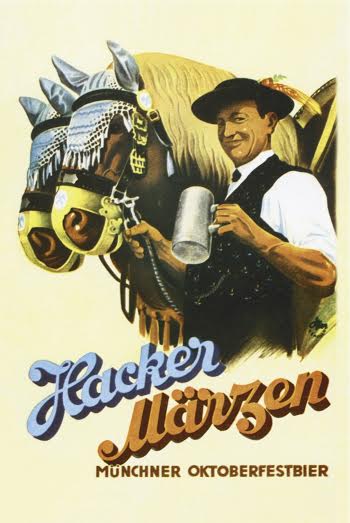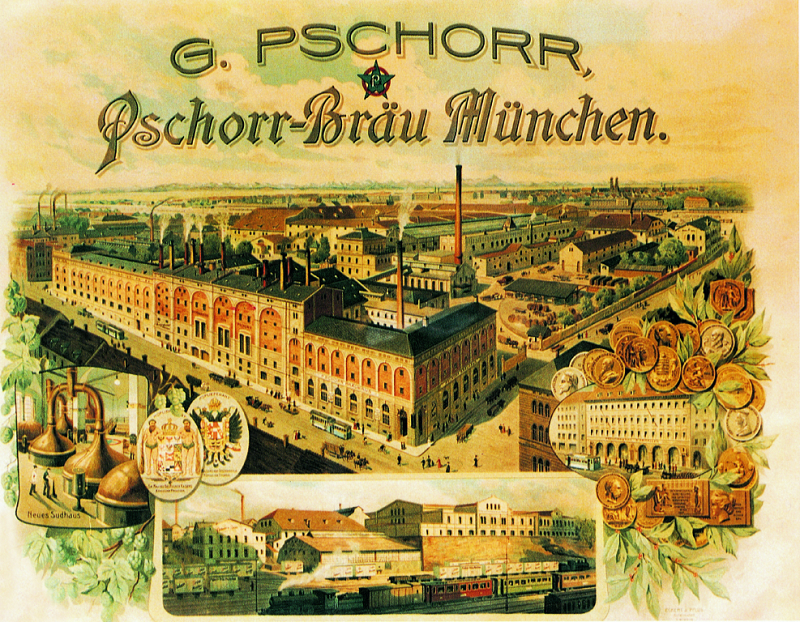Sponsored: In Germany, Beer is Living History
Presented by Hacker-Pschorr Brewery
Every time you drink a Hacker-Pschorr beer, you’re getting a little taste of beer history.
Over 200 years ago, Hacker-Pschorr, along with a select few other breweries, were invited by Bavarian Crown Prince Ludwig to develop a special brew for his marriage celebration to Princess Therese of Saxony-Hildburghausen. The marriage festivities were held on the meadow in front of the city gates and all Munich residents were invited to attend. Afterwards, the area was renamed Theresienwiese (Therese’s Fields) to honor the Crown Princess. Locals soon abbreviated the name simply to “Wiesn.”
The marriage festivities became that romping annual beer celebration known worldwide as Oktoberfest, and the celebration still takes place on Therese’s Fields. Hacker-Pschorr plays a large part as one of only six breweries invited to serve at Munich’s Oktoberfest. The only bier served from the Hacker-Pschorr tents today is the Wiesn, named for Therese’s Fields. Brewed only once a year, just for the celebration, Wiesn is only available while supplies last, and not currently available in the United States.
 Märzen was Hacker-Pschorr’s Original Oktoberfest beer and is the style most Americans equate with Oktoberfest. U.S. craft brewers have embraced this popular style and seasonal Märzens (often called Oktoberfest beers) start hitting retail shelves as early as July, although the traditional Oktoberfest celebration takes place in the 16 days leading up to the first Sunday in October. This means much of Oktoberfest actually happens in September.
Märzen was Hacker-Pschorr’s Original Oktoberfest beer and is the style most Americans equate with Oktoberfest. U.S. craft brewers have embraced this popular style and seasonal Märzens (often called Oktoberfest beers) start hitting retail shelves as early as July, although the traditional Oktoberfest celebration takes place in the 16 days leading up to the first Sunday in October. This means much of Oktoberfest actually happens in September.
The Märzen style of brewing originated in Bavaria in the late 1550s. The word Märzen means “March,” as Märzenbier historically was brewed during that month. Thus, it would be at peak flavor at the time of Oktoberfest and became an important part of the festivities. Hacker-Pschorr’s Original Oktoberfest Märzen is the brewery’s second biggest selling beer by volume in the U.S., after the Weisse. It’s available year-round because of high customer demand.
The training of the brew masters who make these beers reflects the rich history of German brewing. Many Northern European breweries have long required rigorous apprenticeship and education standards for brewers. Since 1417, generations of brew masters have passed down the craft of brewing at Hacker-Pschorr. Martin Zuber, one of Hacker-Pschorr’s senior brew masters, is the caretaker of traditional methods perfected over hundreds of years. Becoming a brew master at Hacker-Pschorr takes 4 to 5 years, and requires both a degree in brewing science and an apprenticeship combining hands-on experience and further classroom instruction.
“We believe in rigorous training of our brew masters as adhering to the Reinheitsgebot requires true mastery of the brewing process to achieve consistent quality,” Zuber said.
Germany’s ancient beer purity law, Reinheitsgebot, which Hacker-Pschorr adheres to, directs that all beer consist of only the four primary ingredients of water, hops, malts, and yeast.

(Image courtesy Hacker-Pschorr)
Hacker-Pschorr got its start as an independent, family-run brewery in the early Middle Ages. Not long after the rise of monastic brewing, the secular population started to embrace brewing as a trade. Until the 1800s, tradesmen guilds regulated the craft and took on brewer apprentices for years of training–aka, indentured servitude.
The European Industrial Revolution changed training and education for many trades, including brewing. It evolved from a more artisanal, localized process to an industrial one, requiring more scientific and engineering knowledge and skills. Brewers and brewery workers had to learn to operate and repair complex machines, understand and plan for raw ingredient purchases, storage, and use, and test their products for quality and consistency throughout the brewing and fermentation processes. The rise of packaging and distributing beer in kegs and bottles also added to the complexity and need for training in machinery and manufacturing systems. Thus, brewing schools and education programs rose to prominence throughout European beer-making countries in the 19th century.
This marriage of beer history and brew master education, much like the marriage that engendered Oktoberfest, combine at Hacker-Pschorr to produce beers today that taste of history itself.

I want to buy some Weiss Dunker beer here in US but cannot find can I order from you ?